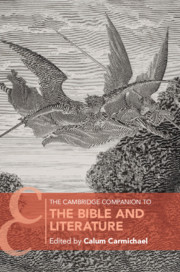Book contents
- The Cambridge Companion to the Bible and Literature
- Cambridge Companions to Religion
- The Cambridge Companion to the Bible and Literature
- Copyright page
- Contents
- Contributors
- Abbreviations
- Introduction
- 1 Literature in the Ancient Near East and the Bible
- 2 The Primary Narrative (Genesis through 2 Kings)
- 3 Reading Biblical Literature from a Legal and Political Perspective
- 4 Biblical Law and Literature
- 5 Kings, Prophets, and Judges
- 6 Prophetic Literature
- 7 Wisdom Literature
- 8 The Gospels
- 9 Paul’s Letters
- 10 Apocalyptic Literature
- 11 Shakespeare’s King Lear and the Bible
- 12 The Bible and John Milton’s Paradise Lost
- 13 The Bible, Shelley, and English Romanticism
- 14 Herman Melville and the Bible
- 15 The Song of Songs and Two Biblical Retellings
- Index
- Other Titles in the Series
- References
10 - Apocalyptic Literature
Published online by Cambridge University Press: 13 March 2020
- The Cambridge Companion to the Bible and Literature
- Cambridge Companions to Religion
- The Cambridge Companion to the Bible and Literature
- Copyright page
- Contents
- Contributors
- Abbreviations
- Introduction
- 1 Literature in the Ancient Near East and the Bible
- 2 The Primary Narrative (Genesis through 2 Kings)
- 3 Reading Biblical Literature from a Legal and Political Perspective
- 4 Biblical Law and Literature
- 5 Kings, Prophets, and Judges
- 6 Prophetic Literature
- 7 Wisdom Literature
- 8 The Gospels
- 9 Paul’s Letters
- 10 Apocalyptic Literature
- 11 Shakespeare’s King Lear and the Bible
- 12 The Bible and John Milton’s Paradise Lost
- 13 The Bible, Shelley, and English Romanticism
- 14 Herman Melville and the Bible
- 15 The Song of Songs and Two Biblical Retellings
- Index
- Other Titles in the Series
- References
Summary
The essay contributes to the scholarly conversation about apocalyptic literature by emending the definition of the genre to take into account the ancient rhetorical techniques the apocalyptic authors use, namely, vivid visual rhetoric. The essay considers the facets of genre, audience, and style, three of the literary elements of ancient apocalyptic literature essential for understanding the Biblical texts. The heart of the essay looks at the main texts of apocalyptic literature in the Bible, Daniel, Mark 13, and Revelation. In looking at them the focus is on storytelling, why the authors told the story in a certain way and what effects this mode of communication might have had on each audience’s political, economic, and social outlook. The discussion about the Biblical materials paves the way for thinking about the way they are used in art, contemporary literature, media, politics, and even religious pilgrimage sights.
- Type
- Chapter
- Information
- The Cambridge Companion to the Bible and Literature , pp. 166 - 180Publisher: Cambridge University PressPrint publication year: 2020
References
Further Reading
- 1
- Cited by

